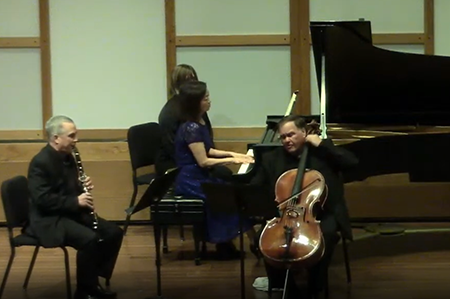by Kevin McLaughlin

Poise was tested early, as no sooner had our musicians sat down to begin when a stentorian “Ah-choo!” boomed out from somewhere in the audience. Startled, Robinson nodded in the sneezer’s direction with a good-natured, “You scared me!”
Barber’s Opus 6 Cello Sonata, written when its composer was 22, is a forthright, dynamic, and impassioned work. The players emphasized the startling harmonic vitality of the music, while luxuriating too in the gorgeous lyricism. You hear Scriabin and other late-Romantic influences, but also genuine originality. There is a sense of “young man in a hurry” urgency — even interrupting the glowing slow movement with its middle Presto.
The keyboardist in the context of an instrumental sonata is often regarded as the supernumerary in someone else’s show. However, Whang was something much more: she handled the difficult piano parts of both the Barber and Prokofiev with gob-smacking assurance and fluency.
Prokofiev’s Cello Sonata in C is one of the composer’s last works, written after he had been labeled a “formalist” and virtually banned by the Soviet authorities. Some see this sonata as Prokofiev’s reaction — but more as a “broken spirit” than as an artist’s “creative response to criticism.”
The opening melody, played searchingly by Robinson, seemed to release pain from the strings of the cello. Forceful gestures are interrupted with unanticipated sweetness, and the players underscored the contrasts for a satisfying mini drama. Whang was Robinson’s equal and worthy partner, manipulating the keyboard with powerful assurance.
Prokofiev’s trademark humor and lyrical gifts are on full display in the middle Moderato, standing in for the usual scherzo. Robinson allowed his tone to be large but also varied, responsive to these puckish episodes as well as to the grandeur of the finale.
The word “intermezzo” implies something that appears between longer, more significant works. But in Brahms’ hands — and in Whang’s — Op. 118, No. 2 made for an independent, isolated moment of beauty, stopping all forward progress. In her pacing and pianistic care she let Brahms’ whispers of sadness linger in the air.
In Brahms’ A-Minor Trio, McKelway served the composer and his colleagues with chestnut resonance and dexterity. As a foil, such clarinet nimbleness might have created challenges for the cellist, but Robinson was up to it — he mirrored McKelway with supple lines of his own and a slimmed down timbre. Intimate expression continued in the Adagio, mixed with passion. Tenderness served as a balm just as Whang’s playing had in the Intermezzo. The players indulged Brahms’ metric dodges and snares in the finale without getting hurt by them.
Published on ClevelandClassical.com November 14, 2023.
Click here for a printable copy of this article



